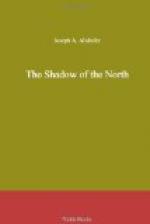When night came they were dry again, and youth had taken no harm. The next day they struck an Indian trail, but both Willet and Tayoga said it had been made by less than a dozen warriors, and that they were going north.
“It’s my belief,” said Willet, “that they were warriors from the Ohio country on their way to join the French along the Canadian border.”
“And they’re not staying to meet us,” said Colden. “I’m afraid, Will, it’ll be some time before you have a chance to show your unbottled Quaker valor.”
“Perhaps not so long as you think,” replied Wilton, who had plenty of penetration. “I don’t claim to be any great forest rover, although I do think I’ve learned something since I left Philadelphia, but I imagine that our building of a fort in the woods will draw ’em. The Indian runners will soon be carrying the news of it, and then they’ll cluster around us like flies seeking sugar.”
“You’re right, Mr. Wilton,” said Willet. “After we build this fort it’s as sure as the sun is in the heavens that we’ll have to fight for it.”
Two days later they reached the site for their little fortress which they named Fort Refuge, because they intended it as a place in which harried settlers might find shelter. It was a hill near a large creek, and the source of a small brook lay within the grounds they intended to occupy, securing to them an unfailing supply of good water in case of siege.
Now, the young soldiers entered upon one of the most arduous tasks of the war, to build a fort, which was even more trying to them than battle. Arms and backs ached as Colden, Wilton and Carson, advised by Willet, drove them hard. A strong log blockhouse was erected, and then a stout palisade, enclosing the house and about an acre of ground, including the precious spring which spouted from under a ledge of stone at the very wall of the blockhouse itself. Behind the building they raised a shed in which the horses could be sheltered, as all of them foresaw a long stay, dragging into winter with its sleet and snow, and it was important to save the animals.
Robert, Willet and Tayoga had a roving commission, and, as they could stay with Colden and his command as long as they chose, they chose accordingly to remain where they thought they could do the most good. Robert took little part in the hunting, but labored with the soldiers on the building, although it was not the kind of work to which his mind turned.
The blockhouse itself, was divided into a number of rooms, in which the soldiers who were not on guard could sleep, and they had blankets and the skins of the larger animals the hunters killed for beds. Venison jerked in great quantities was stored away in case of siege, and the whole forest was made to contribute to their larder. The work was hard, but it toughened the sinews of the young soldiers, and gave them an occupation in which they were interested. Before it was finished they were joined by another small detachment with loaded pack horses, which by the same kind of miracle had come safely through the wilderness. Colden now had a hundred men, fifty horses and powder and lead for all the needs of which one could think.




